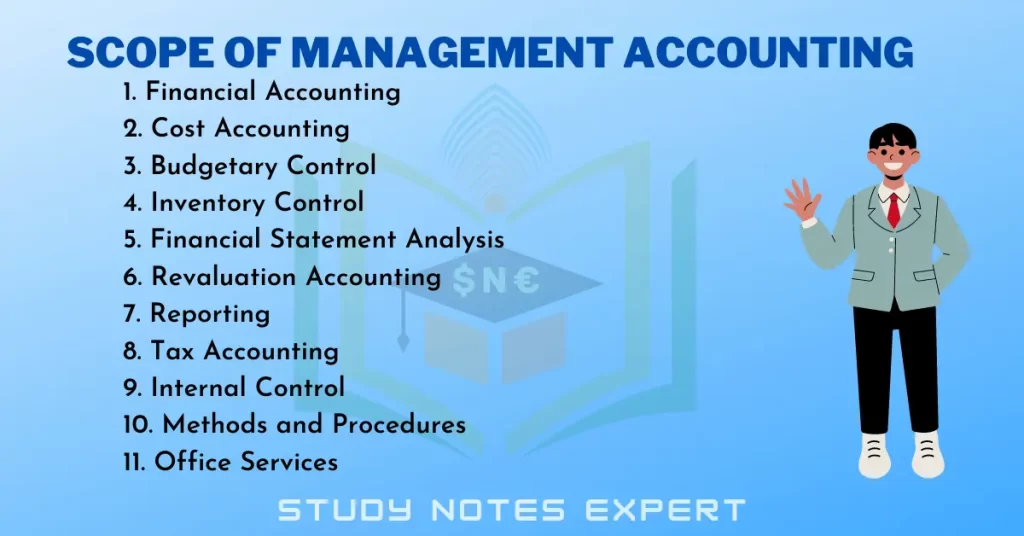Management accounting is a very crucial part of accounting. It is highly impactful in decision-making. Here, you will learn the nature of management accounting and the scope of management accounting for your better understanding. You have studied the nature scope of management accounting.
Meaning of Management Accounting
The practice of delivering financial resources and information to managers for decision-making is known as the management accounting. Management accounting aims to use this statistical data to make more informed decisions. It will help you manage your company’s growth and day-to-day operations. In the ahead of this blog, we will explain the nature and scope of management accounting. In the following section, you will know the management accounting nature and scope.
Nature of Management Accounting
In this section, we will come to know the characteristics of management accounting.

1. It Focuses More on the Future
It is concerned with the nature of management accounting regarding the future. The management can foresee and plan their future course of action with its assistance.
2. Methods of Selective Nature
It is a method with a selective focus. It considers only data from the profit and loss account and balance sheet, which is relevant and valuable to the management.
3. It demonstrates the causality of events
On the profitability of the company, the impact of numerous decisions, including pricing, advertising a new product, sales mix, cost control, etc., is studied. As it shows that the nature of management accounting establishes the cause and effect relationship.
4. It Provides information and not Decisions
The management accountant never takes any decisions but only provides data based on which the management takes decisions. The nature of management accounting shows that it only provides information to the administration.
5. Use of Special Methods and Concepts
Some techniques included ration analysis, budgetary control, cash flow statement, etc. The methods used will depend upon the nature of the problem and the prevailing circumstances.
6. No set formats
It does not provide information in a prescribed proforma like that of financial accounting. It includes information that may be more suitable for the management in making various decisions. There are no set formats for providing information on the nature of management accounting.
7. No Specific Rules Followed
No specific rules are followed, like management accounting. Though management accounting tools are the same, their use differs from one form to another.
8. Purely Optional
It is purely a voluntary technique, and there is no statutory obligation. Its adoption by a firm depends upon its utility and desirability.
Scope of Management Accounting

1. Financial Accounting
Financial Accounting includes in the scope of management accounting. It uses the data provided by financial accounting. In Management Accounting, funds flow statements, cash flow statements, ration analysis, etc. are prepared based on data taken from profit and loss accounts and balance sheets which are a part of financial accounting.
2. Cost Accounting
It provides information about the total cost and per unit cost of products and services. This information is very helpful in cost control. It includes in the scope of management accounting. It contains standard costing, operating costing, etc., which help make various types of managerial decisions.
3. Budgetary Control
Various types of budgets should prepare under budgetary control. Actual performance is in comparison to the budgeted figures, and the deviations are analysed to fix the responsibility and take remedial action.
4. Inventory Control
Various techniques are helpful to keep adequate control of stock. It includes in its scope all the inventory control techniques. However, the scope of management accounting includes inventory control.
5. Financial Statement Analysis
It employs various techniques to analyse and interpret financial data to make it meaningful. Also, it is understandable to the management and multiple users of financial statements.
6. Revaluation Accounting
The firm’s resources valuation is at its current price instead of its historical cost. It is helpful to measure the net profit and capital of the business in absolute terms and not in monetary terms.
7. Reporting
Reports are presented to the management in graphs, diagrams, ratios or other statistical techniques so that users can easily understand them. The information may include profit and loss accounts, balance sheets, fund flow statements, cash flow statements, etc. However, reporting comes into the scope of management accounting.
8. Tax Accounting
It includes tax planning, determination of taxable income, filing the return of income in time and the payment of taxes.
9. Internal Control
It includes internal control methods such as internal checks, internal audits, efficient office management, etc.
10. Methods and Procedures
It also includes the establishment of the most economical system of accounting suitable to the firm. It lays down the methods and procedures for smoothly conducting different business activities.
11. Office Services
In a small organisation, the scope of management accounting includes office services also. An organisation may require a management accountant to maintain and control office services. It includes data processing, filing, copying, communication, etc.
Conclusion
In this blog, we know about all the characteristics of management accounting and the scope of management accounting. The nature of management accounting includes no set formats, and it is purely optional.
What is Management Accounting and Example?
Management accounting is the process of analyzing and communicating financial information to managers within organizations, helping them make decisions to fulfill their goals.
Some common examples of management accounting include creating budgets, analyzing costs, forecasting revenues, and measuring financial performance.
What is the Main Role of Management Accounting?
1. The main role of management accounting is to provide information that is useful in making business decisions.
2. This information can be used to make decisions about pricing, production, investment, and other strategic decisions.
3. Management accounting also provides information about the financial performance of a company. This information can be used to make decisions about how to improve financial performance.
Why is Management Accounting Important?
Management accounting is crucial because
1. It gives financial information which is used by managers to make decisions regarding the distribution of resources within the organization.
2. Financial statements can be used to make decisions regarding price, investment, or other important strategic decisions.
What is Management Accounting Nature and Scope?
Management accounting is figuring out, measuring, studying, and interpreting economic and non-monetary data to assist management decision-making, making plans, manipulating, and overall performance assessment. The nature and scope of management accounting help managers make informed selections and attain an enterprise’s strategic goals by imparting accurate and applicable facts about the organization’s economic and non-economic performance.

